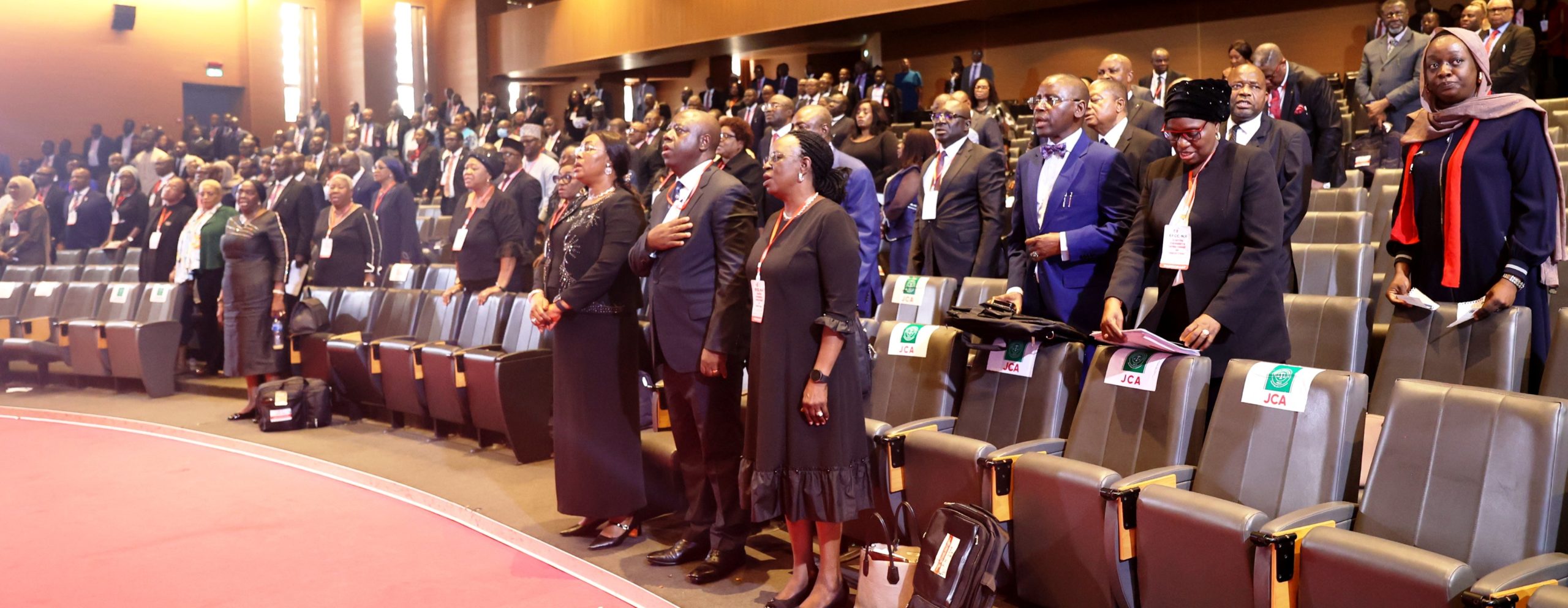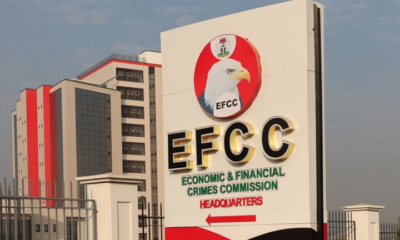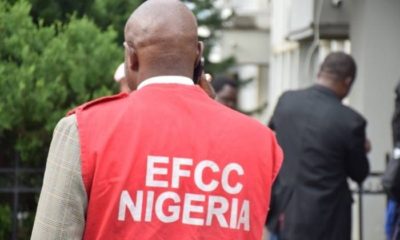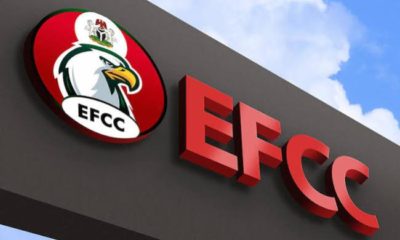NEWS
EFCC-NJI Workshop: Participants Move Against Courts’ Frivolous Restraining Orders

Participants at the 6th Economic and Financial Crimes Commission’s (EFCC) – National Judicial Institute’s (NJI) Capacity Building Workshop for Justices and Judges have called on judges handling economic and financial crimes as well as other acts of corruption across the country, to exercise more caution in the granting of restraining orders.
This call was made in Abuja on Wednesday, October 9, 2024, in a Communique issued at the end of the Workshop. According to the participants, comprising justices and judges of the Supreme Court, the Court of Appeal, high courts, prosecutors, investigators, anti-corruption experts, civil society groups, media executives and other stakeholders in the anti-corruption corridor, granting of unjustified restraining orders are posing challenges to the speedy resolution of corruption cases.
“Courts should be wary of granting unjustified restraining orders issued at the behest of government officials and suspects under investigation as this can erode public trust and confidence in the judiciary”, they said. Other highlights of the Communique are: “need for increased reliance on non-conviction based asset forfeiture procedures in the forfeiture of assets, especially digital assets; need for judges with track records of handling economic and financial crimes cases to be designated to handle such cases, need for increased emphasis on intelligence-driven investigation that leverages existing information technology infrastructures rather than relying mostly on whistle-blowers”
Participants also emphasized the need for developing and sustaining synergy and coordination among all stakeholders in the administration of criminal justice in Nigeria as well as the need for law enforcement agencies to work closely with international law enforcement agencies such as INTERPOL, AFRIPOL and others to enhance efforts to combat cross-border financial crimes. To effectively address issues that arise in the investigation of Money Laundering/Combating the Financing of Terrorism (AML/CFT) cases, participants sought a more inclusive approach that involves all intermediaries, aligning with the country’s risk profile and fostering coordinated efforts among all stakeholders.
ALSO READ: EFCC Nabs 33 Internet Fraudsters With Fake Dollars In Port Harcourt
While maintaining that the judiciary stands as a critical stakeholder in the administration of justice, the Workshop admitted that the adjudicatory functions of the judiciary cannot be judiciously discharged without diligent investigation and prosecution by key agencies. To this end, the EFCC was enjoined to take advantage of the extant fast-track rules of court to expedite the trial of economic and financial crimes cases. Additionally, there is a “need for constant review of strategies, techniques and practices in the detection, investigation and prosecution of financial crimes to aid Anti-corruption agencies secure more convictions in high profile cases. This is in addition to continuous training of Judicial officers and staff of Anti-Corruption Agencies to deal with new trends and best practices on digital forensics and other emerging typologies of economic and financial crimes”. Participants also called for strict adherence to the Administration of Criminal Justice Act(ACJA) which provides a comprehensive framework for criminal justice procedures for efficient and fair administration of justice in Nigeria.
EFCC Chairman, Ola Olukoyede, in a closing remark, appreciated all the participants and pointed out that Nigeria still stands out as a nation making good success of asset recoveries across the world. “At every international gathering, Nigeria is regarded highly for its records of staggering recoveries of assets. I called on the judiciary to continue to offer us more support in tackling corruption cases”, he said.
The Workshop which was declared open by President Bola Ahmed Tinubu and was themed “Integrating Stakeholders in Curbing Economic and Financial Crimes”. It drew a mammoth crowd of stakeholders including former Secretary General of the Commonwealth, Chief Emeka Anyaoku, Senate President, President of the Court of Appeal, Attorney-General and Minister of Justice, Chief Justice of Nigeria, among others.
NEWS
Corps Members Safe In Benue, Gov Alia Assures As Orientation Kicks Off
The Governor of Benue State, Rev. Fr. Hyacinth Alia, has assured corps members deployed to the state of their safety, despite rising security concerns across the region.
Speaking on Friday through the Commissioner for Youth, Sports Development and Creativity, Hon. Terkimbi Ikyange, Governor Alia said his administration is working closely with security agencies to ensure the safety and well-being of all National Youth Service Corps (NYSC) members throughout their service year.
“Sadly, our nation is currently bedevilled with security challenges, and Benue State is not exempt,” the governor stated.
“However, let me quickly allay your fears and assure you that, as a government, we are committed to ensuring that your safety is guaranteed throughout your stay in the state.”
He noted that comprehensive protective measures have been implemented across corps lodges and other areas occupied by corps members in the state.
Governor Alia also encouraged the new corps members to take full advantage of the NYSC’s Skills Acquisition and Entrepreneurship Development (SAED) programme, describing it as a “gateway to great opportunities.”
He further urged them to use their God-given talents to contribute meaningfully to the nation’s development.
In her remarks, the State Coordinator of the NYSC, Mrs. Veronica Garba, thanked the governor and the people of Benue for their continued support of the scheme.
She charged the new inductees to actively participate in the four cardinal components of the orientation course: physical training, motivational lectures, sporting activities, and SAED.
The orientation exercise welcomed a total of 1,600 corps members, officially inducted into the programme by Justice Peter Ukande, who represented the Chief Judge of Benue State, Justice Maurice Ikpambeae.
NEWS
Ministry Appoints New Director For DUFUTH, Uburu

The Federal Ministry of Health and Social Welfare has approved the appointment of a new Acting Director of Administration for the David Umahi Federal University Teaching Hospital (DUFUTH), Uburu.
This was contained in a statement in Uburu on Thursday by the DUFUTH’s Public Relations Officer, Agwu N. O.
According to Agwu, the new appointee is Edith Anih, an indigene of Enugu State with relevant working experience, having worked at the University of Nigeria Teaching Hospital (UNTH), Enugu, where she was Deputy Director of Administration.
It was gathered that the approval was conveyed in a letter dated April 23, 2025, addressed to the Chief Medical Director.
Prior to her appointment, Anih held the position of Deputy Director of Administration at the University of Nigeria Teaching Hospital (UNTH), Enugu.
ALSO READ: CVFF- House of Reps Backs Marine & Blue Economy Ministry
He wrote, “Mrs. Anih Edith Ndidi is a seasoned administrator born on May 22, 1973. She is married and hails from Enugu State, specifically Enugu South Local Government Area.
“She holds a Bachelor’s degree in Public Administration and a Master’s degree in Human Resources Management. She is also an associate member of the Institute of Health Service Administrators of Nigeria (IHSAN).
“The Management of DUFUTH extends a warm welcome to the new DA and looks forward to collaborating with her as she brings a fresh perspective to the hospital’s administrative leadership.”
NEWS
FG To Launch Forensic Audit Of NNPCL Amid Economic Reforms, Says Edun
The Federal Government of Nigeria is set to launch a forensic audit of the Nigerian National Petroleum Company Limited (NNPCL), in a major move aimed at enhancing transparency and accountability in the oil and gas sector.
This was disclosed by the Minister of Finance and Coordinating Minister of the Economy, Wale Edun, at the ongoing Nigerian Investor Forum, held on the sidelines of the IMF/World Bank Spring Meetings in Washington DC.
READ ALSO: Loans Necessary For Budget Despite High Revenue Collections – Wale Edun
Edun explained that the upcoming audit, along with recent changes in NNPCL management, is part of a broader effort to reform the state-owned oil company and rebuild trust in Nigeria’s economic institutions.
Addressing top global investors, including representatives from financial giant J.P. Morgan, Edun outlined a series of bold economic reforms introduced by the administration of President Bola Tinubu.
He said the measures are already yielding positive results and have laid a strong foundation for future growth.
“Our goal is not just to maintain this momentum, but to accelerate it,” Edun said. “We are targeting seven per cent annual growth, and we believe the policies we have implemented have laid the groundwork to achieve this.”
According to Edun, Nigeria’s economy grew by 3.84% in the fourth quarter of 2024, with an overall annual growth rate of 3.4%.
He described the government’s economic strategy as “unprecedented,” adding that key indicators such as the budget deficit, trade balance, and exchange rate have all shown signs of improvement.
“We said we would do it, and now we have done it. This time, we’re staying the course,” he emphasized.
The minister also highlighted the government’s focus on agriculture as a critical driver of economic growth, saying efforts are underway to close the food supply gap by empowering local producers.
“We aim to close the food supply gap, not by importing more, but by enabling domestic producers to scale and innovate,” he said.
In the area of infrastructure, Edun announced that 90,000km of fibre optic cable has been rolled out to boost internet connectivity, especially for young Nigerians and the tech ecosystem.
Additionally, 4,000km of roads have been earmarked for private sector participation, with the first 1,000km already approved for construction.





















